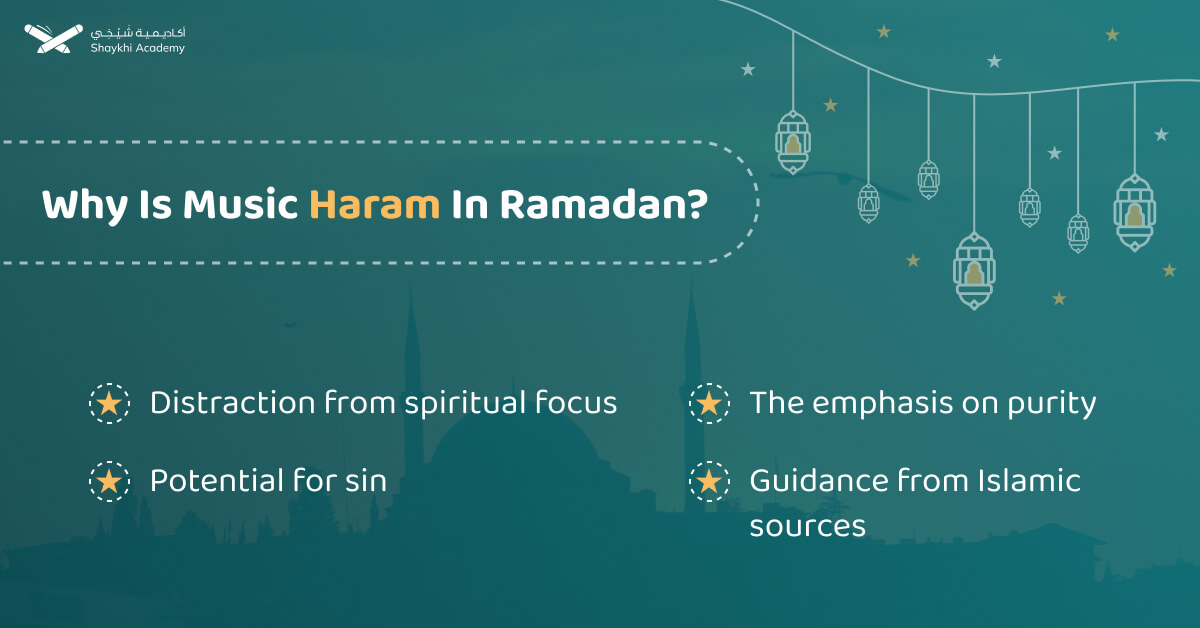Listening to music During Ramadan, including rap, is generally considered impermissible during Ramadan according to Islamic teachings. This is because Ramadan is a time for increased devotion and spiritual growth, and engaging in activities that may distract from these objectives, such as listening to music, is discouraged. By prioritizing acts of worship and self-discipline, believers can fully embrace the spiritual benefits of Ramadan and strengthen their connection with Allah.
Ramadan music rules Meaning:
Ramadan music rules encompass the Islamic principles and guidelines regarding the permissibility of listening to music during the sacred month of Ramadan. According to Islamic teachings, engaging in any form of music, including genres like rap, is generally considered impermissible during Ramadan.
This prohibition is firmly rooted in the overarching principles of abstaining from distractions and maintaining spiritual focus during this holy period. Muslims are encouraged to prioritize acts of worship, self-discipline, and spiritual elevation during Ramadan, refraining from activities like listening to music that may hinder spiritual progress and compromise the sanctity of the fasting experience.
The emphasis on spiritual purity, avoidance of sin, and adherence to Islamic values underscores the importance of observing these rules during Ramadan. Overall, the Ramadan music rules serve to uphold the sanctity of the holy month, foster spiritual growth, and strengthen believers’ connection with Allah.
Can You Listen To Music During Ramadan?
Based on the teachings of Islam as outlined in the Quran and the Hadith, it is not permissible for a believer to listen to music during the sacred month of Ramadan. This ruling is based on the understanding that Ramadan is a time for increased devotion, reflection, and spiritual growth, and engaging in activities that may distract from these objectives, such as listening to music, is discouraged.
The Quran instructs us to observe fasting with the intention of attaining piety (Surah Al-Baqarah, 2:183), and the Hadith of the Prophet Muhammad (peace be upon him) further emphasizes that fasting is not merely abstaining from food and drink but also refraining from vain talk and obscenity.
Additionally, the Hadith literature includes references that mention musical instruments among the things that some individuals would make permissible, indicating a general prohibition on music.
Therefore, in line with these teachings, it is clear that listening to music during Ramadan contradicts the spiritual objectives of this blessed month and is considered impermissible. As believers, it is our duty to adhere to the guidance provided by the Quran and the teachings of the Prophet Muhammad (peace be upon him) in order to attain spiritual purification and closeness to Allah.
Do You Get Sins For Listening To Music In Ramadan?
Yes, according to the teachings of Islam as outlined in the Quran and the Hadith, listening to music during Ramadan can result in committing sins. While fasting during Ramadan, Muslims are expected to engage in acts of worship, self-reflection, and spiritual purification.
Listening to music, which is generally considered to be a form of entertainment and may contain lyrics or themes that are contrary to Islamic values, can distract from these spiritual pursuits and lead to sinful behavior.
Does listening to music break my fast?
According to Islamic teachings, listening to music alone does not invalidate or break one’s fast during Ramadan. However, it is important to note that engaging in sinful or distracting activities, including listening to music, can diminish the spiritual rewards of fasting and may even lead to the loss of its benefits altogether.
Therefore, although listening to music itself does not nullify the fast, it is advisable for believers to avoid it during Ramadan in order to fully benefit from the spiritual rewards and blessings of fasting. Instead, they can dedicate their time and energy to acts of worship, recitation of the Quran, reflection, and acts of charity.

Punishment For Listening To Music In Islam
In Islam, the punishment for listening to music is not explicitly specified in the Quran or the Hadith. However, engaging in activities that are considered sinful, such as listening to music with inappropriate lyrics or themes, may lead to spiritual consequences and distancing oneself from Allah’s guidance.
It’s essential to remember that Islam emphasizes repentance, forgiveness, and the opportunity for redemption. If one commits a sin, including listening to inappropriate music, they are encouraged to sincerely repent, seek forgiveness from Allah, and strive to avoid repeating the same mistake in the future.
Why Is Music Haram In Ramadan?
Music is considered haram (prohibited) in Ramadan for several reasons, based on Islamic teachings and principles:
1. Distraction from spiritual focus:
Ramadan is a sacred month dedicated to increased worship, reflection, and spiritual growth. Engaging in activities like listening to music can distract individuals from their spiritual objectives and diminish the essence of fasting, which is to attain piety and closeness to Allah.
2. Potential for sin:
Music, particularly certain genres or lyrics, may contain content that is inappropriate or contradictory to Islamic values. Exposing oneself to such content during Ramadan can lead to sinfulness and distance from the teachings of Islam.
3. The emphasis on purity and abstention:
Fasting in Ramadan involves not only refraining from physical nourishment but also abstaining from negative behaviors and distractions. Listening to music, especially if it involves lyrics or themes that are contrary to Islamic teachings, can disrupt the purity and sanctity of the fasting experience.
4. Guidance from Islamic sources:
Islamic scriptures, including the Quran and the Hadith (sayings and actions of the Prophet Muhammad, peace be upon him), provide guidance on various aspects of life, including permissible and prohibited activities. While there may not be a specific verse in the Quran explicitly forbidding music, interpretations of Hadith literature and the broader principles of Islamic jurisprudence lead to the conclusion that engaging in music is generally discouraged, particularly during times of heightened spiritual devotion such as Ramadan.
Overall, the prohibition of music during Ramadan serves to uphold the sanctity of the holy month, foster spiritual growth, and maintain adherence to Islamic values and principles. It is part of the broader commitment to self-discipline, self-reflection, and devotion to Allah during this auspicious time.
Can You Listen To Rap During Ramadan?
As a believer observing Ramadan, you understand that listening to rap music during this sacred month is a matter that requires careful consideration. According to Islamic teachings, engaging in any form of music, including rap, can be deemed as haram (prohibited) during Ramadan. This prohibition is rooted in the overarching principles of abstaining from distractions and maintaining spiritual focus during this holy period.
While rap music may vary in content and style, it often includes elements that can potentially lead to sinfulness or compromise the purity of one’s fasting experience. The teachings of Islam emphasize the importance of guarding one’s ears and heart against anything that may lead to disobedience to Allah or weaken one’s faith.
Unlock the Path to Quranic Mastery with Shaykhi Academy!
Are you seeking the finest Quranic education right from the comfort of your home? Look no further! Shaykhi Academy stands out as a premier online Quran learning platform, dedicated to providing exemplary education to both children and adults.
Why Choose Shaykhi Academy?
- Connect with highly qualified native tutors.
- Flexible scheduling to suit your busy lifestyle.
- Affordable classes tailored for all levels.
- Accessible from anywhere around the globe.
Discover Our Range of Courses:
- Arabic Noorani Qaida: Lay a solid foundation for Quranic studies.
- Online Quran Classes for Kids: Engaging lessons for lifelong learning.
- Tajweed Rules for Kids: Learn to recite with confidence.
- Quran Hifz for Kids: Step-by-step guidance to memorize the Quran.
- Quran for Adults: Introduce yourself to Quran reading and Tajweed rules.
- Online Arabic Courses: Master the language of the Quran.
- Islamic Studies: A wide range of topics related to Islam, including theology, law, Quranic studies, Hadith.
Don’t Miss Out on Your Chance to Excel!
Whether you’re a beginner or seeking advanced knowledge, Shaykhi Academy can guide you! Book your free trial now and make Ramadan 2024 your Quranic turning point!

Conclusion:
In conclusion, the rules regarding music during Ramadan are firmly grounded in Islamic teachings and principles. Listening to music, including genres like rap, is generally considered impermissible during this sacred month. This prohibition is based on the understanding that Ramadan is a time for increased devotion, reflection, and spiritual growth, and engaging in activities that may distract from these objectives is discouraged.
The emphasis on purity, abstention from sin, and adherence to Islamic values during Ramadan underscores the importance of avoiding music and other distractions that may compromise the sanctity of the fasting experience. As believers, it is our responsibility to prioritize acts of worship, self-discipline, and spiritual elevation during Ramadan, and to abstain from activities that may hinder our spiritual progress.
By adhering to these guidelines, we can fully embrace the blessings and opportunities for spiritual growth that Ramadan offers, and strengthen our connection with Allah.

















































